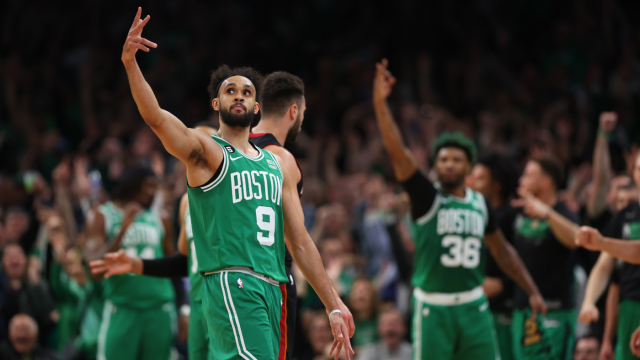Derrick White seemed like a relatively inconspicuous trade deadline addition in 2022. He was, after all, dealt on the same day as James Harden. Those are the kinds of players that teams tend to set their roster-building plans around. They hoard assets for one big score and otherwise hope to buy low on role players with upside. When Brad Stevens took over the Boston Celtics, rumors suggested they might be trying to do that same thing with Jayson Tatum's lifelong friend Bradley Beal.
But the presence of Tatum and Brown has allowed Stevens to take a somewhat novel approach to roster-building since he took over for Danny Ainge in 2021. While the rest of the league has gone big-game hunting, he has instead spent his draft capital paying fair market value for good, established players. All of his moves have paid dividends. Swapping Kemba Walker and one pick for Al Horford helped Boston build its elite defense. Malcolm Brogdon won Sixth Man of the Year for the Celtics this season. But on Saturday, the White deal proved the most beneficial of them all.
The Celtics saved their 2023 season for the price of Josh Richardson, their 2022 first-round pick and a top-1 protected 2028 first-round swap. Had Derrick White not swooped in for the biggest putback in Celtics history, Miami would have eliminated Boston in Game 6 of the Eastern Conference finals. It was the sort of high-IQ play White has spent the past year and a half making for Boston.
In his first full season as a Celtic, White set new career-highs in 3-point shooting and rebounding, committed the fewest turnovers per possession of his career and ultimately earned All-Defense honors earlier this month. White, still only 28, has plenty of prime seasons ahead of him, and with a salary below $17 million, he's still on the lower end of the starting point guard scale. All of this begs a simple question: why did San Antonio trade him in the first place?
The answer is fairly simple: redundancy. Between 2016 and 2021, the Spurs spent six first-round picks on perimeter players. Five of those players, including White, turned out to be good. Dejounte Murray is an All-Star. Keldon Johnson and Devin Vassell have developed into core pieces in San Antonio. Lonnie Walker IV just had a breakout season for the Lakers. Joshua Primo was waived due to multiple incidents in which he allegedly exposed himself to women, but at that point, he was a lottery pick in his rookie season with no major incidents on his track record.
The Spurs didn't have minutes and touches for all of them. Primo, their most recent pick, appeared in just 20 of San Antonio's first 49 games. Walker and Vassell were primarily reserves. Yet White, in many ways, overlapped most with the best young Spur of them all. Both White and Murray were inconsistent 3-point shooters and strong defenders. Both needed the ball in their hands to play most effectively. Murray had just made his first All-Star Team. White's shooting had regressed. It wasn't clear that the two could fit together for the long haul.
The Spurs had little organizational direction at the time. Though San Antonio would eventually sneak into the play-in round, the Spurs were 20-35 on deadline day. So they did what most bad teams do: they kicked off a rebuild. White was just the first domino. Murray would eventually be dealt for a haul as well, and Walker left in free agency. Their decision to tear down their mediocre team was ultimately proven correct on lottery night when the ping pong balls gifted them Victor Wembanyama.
If he reaches his ceiling, the Spurs might get genuine value out of that 2028 pick swap. Only time will tell if the 2022 pick they got for White will eventually turn into an adequate replacement. Blake Wesley, their choice with Boston's pick, had a quiet rookie year. Most Spurs do. White averaged 3.2 points per game in his rookie season. He guarded Jamal Murray in the playoffs of his second. The Spurs might like to still have White, but if his presence had resulted in a few extra wins, they might not have landed Wembanyama. They're ultimately happy with how things played out.
The real loser here is the field. White was available at a relatively reasonable price, yet it was one fewer and fewer teams appear comfortable paying. There were nine separate deals on deadline day that featured multiple second-round picks changing hands, but only two deals revolved around one first-round pick getting dealt for a single role player: Toronto's acquisition of Jakob Poeltl and New York's acquisition of Josh Hart.
That is the market inefficiency Stevens has used to build the supporting cast around his two stars. The Brogdon trade was a success. The Horford trade was a home run. But now the White trade has become the poster child for Boston's entire roster-building philosophy. It turns out, paying fair market value for proven NBA role players is a viable path to winning after all.

